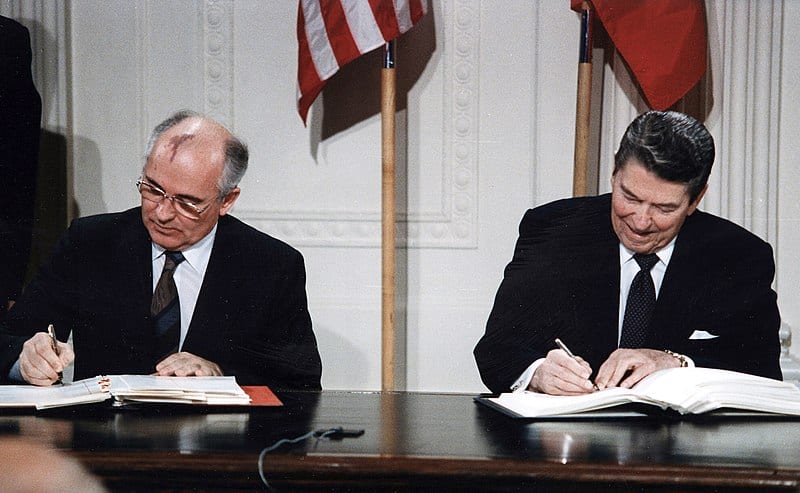 National Archives and Records Administration
National Archives and Records Administration
Post-INF: A New Arms Race?
Fears of a nuclear arms race are rising, as Russian President Vladimir Putin followed the United States’ move to suspend participation in the 1987 Intermediate-range Nuclear Forces Treaty (INF) on Saturday. Putin also made clear that he would follow suit with the United States when it comes to research, development, and deployment of any new nuclear weapons. He stated that “Moscow will not deploy such weapons in the European part of the country or elsewhere unless the US does so,” according to Al Jazeera.
The United States’ intention to suspend the treaty was made clear in December of 2018, amid U.S. claims that Russia’s 9M729 missile violates the agreement. These claims are true; the 9M729 violates the acceptable range set for a ground-launched nuclear cruise missile, and Russia has been unwilling to provide suitable evidence to refute this fact.
Another potential reason for the United States’ new lack of commitment to the treaty could be anxieties concerning China’s nuclear build-up. Limited by the INF, the United States has been unable to place intermediate-range missiles on land near China to deter any potential nuclear aggression. Meanwhile, China has been able to build up its nuclear capabilities, starting programs such as the PLA Rocket Force (PLARF). A report by the Dept. of Defense made clear that “PLARF trains, equips, and operates China’s land-based nuclear and conventional missiles. In 2017, it advanced long-term modernization plans to enhance its ‘strategic deterrence capability.’”
But does leaving the INF give the United States any strategic advantages in nuclear deterrence? If it does, the ensuing issues far outweigh the benefits.
It is true that in the absence of the INF, the U.S. would no longer be prohibited by the treaty from, developing, building, and deploying ground-launched intermediate-range nuclear missiles closer to Russia. But this would require the approval of a host country such as Poland or Romania, as Western European countries are unlikely to allow this. Such a move would also be countered easily, likely through Russian use of intermediate-range Kalibr missiles, which can also be launched from the ground if Russia introduces a new ground launcher. This scenario places the entirety of Europe within the bounds of a swift Russian nuclear attack, upsetting the balance that formerly existed, and potentially setting up Romania and Poland to be volatile priority targets for Russia. This places both countries in a similar situation to that which led to the signing of the INF treaty in the first place.
Even if backing out of the INF allows the United States to place deterrence systems in new locations, any rollout of more nuclear weapons is sure to spark concern in China, Russia, and the international community as a whole. This is more likely to increase tensions in these regions, and ultimately contradict the premise for deploying those weapons.
Increasing nuclear tensions between global powers has never been a successful tactic in preventing the possibility of a nuclear war. With the INF scrapped along with any hope of reviving it within the next 6 months, the only remaining nuclear treaty between the U.S. and Russia is the New Strategic Arms Reduction Treaty (New START), which was signed in 2010. New START limits the number of missiles and warheads each country can deploy at any given time.
However, New START is set to expire in 2021. Putin has made clear as of last year that he is willing to extend the treaty, but President Trump has deemed New START a “bad deal,” according to CNBC. The best-case scenario, it appears, is an extension of New START, which is included as a follow-on option for the treaty’s original 10 year term.
Although Russian Foreign Minister Sergei Lavrov gave an unconvincing statement denying the development of a new Cold War, it is completely within the realm of possibility that we will see a new arms race, especially if the U.S. and Russia fail to renegotiate or renew New START by 2021.
Ronald Reagan, who joined with Gorbachev in 1987 to sign the INF, was adamant that joint nuclear reduction is the best way to peace. In his 1984 State of the Union Address, he famously said “The only value in our two nations possessing nuclear weapons is to make sure they will never be used.” Ideally, the United States and Russia will emulate the ideas of their former leaders and work diplomatically to ensure the security of everyone.





